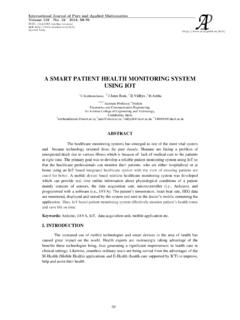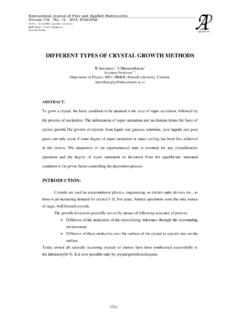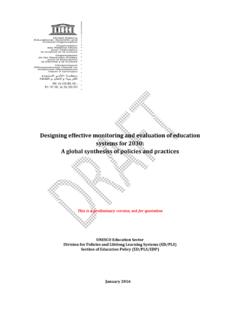Transcription of Importance of Outcome B ased E ducation (OBE) to Advance ...
1 Importance of Outcome Based education (OBE) to Advance Educational Quality and enhance global Mobility , , , 1 Professor, Department of Computer Science and Engineering, Mahaveer Institute of Science and Technology, Hyderabad. 2 Professor, Department of Mechanical Engineering, Mahaveer Institute of Science and Technology, Hyderabad. 3 Professor, Department of Mechanical Engineering, Karpagam College of Engineering, Coimbatore 4 Professor, Department of Electronics and Communication Engineering, Mahaveer Institute of Science and Technology, Hyderabad. Email: ABSTRACT In the era of globalization, traditional education system is losing its relevance. In today s world, everything changes very rapidly and continuously. More skills are required to work with very fast developing technology. The educational institutions should produce graduates to cope with technological development. Thus to overcome the requirement, it is mandatory to shift from traditional education system to Outcome Based education (OBE), which includes Program Outcomes (PO), Program Specific Outcomes (PSO), and Course Outcomes (CO).
2 Keywords: Outcome Based education (OBE), Competence, Program Outcomes (PO), Program Specific Outcomes (PSO), Course Outcomes (CO), Program Educational Objectives (PEO) 1. Introduction With contrary to the fact that most teachers put the center of their attention too much on what they teach rather than on what their students learn, OBE emphasizes on what is expected from the student to finally achieve when they complete their course rather than how they achieved it. Outcome based education is defined as an approach to education in which decisions about the curriculum are driven by the outcomes the students should display by the end of the course- professional knowledge, skills, abilities , values and attitudes- rather than on the educational process. It highlights the fact that you have to know the final destination of your journey before you start voyaging. Exploring new ways for designing tertiary education is a worldwide pursuit.
3 There is a need for tertiary education to provide both professional knowledge/skills and all-round attributes to the graduates so as to enable them to face the diversified yet global demands of the 21st century society [1]. The attention now of different institution of higher education in different nations is on students learning outcomes and assessment. The OBE comes in the form of competency-based learning standards and outcomes-based quality assurance monitoring. OBE is being recognized as the most important educational component of societies with knowledge based economy. OBE designed to achieve the predefined learning outcomes. OBE model of accreditation focuses on objectives and outcomes of an engineering programme. OBE starts with a clear picture of what a student should be able to do, design the curriculum, teaching-learning process and International Journal of Pure and Applied MathematicsVolume 119 No.
4 17 2018, 1483-1492 ISSN: 1314-3395 (on-line version)url: to ensure that the outcomes are attained. OBE model facilitates Continuous Quality Improvement (CQI) [2]. 2. Traditional education system The traditional teaching style is often described as teacher-centered, lectures, curriculum centered, and formal in other words transmitting information from the teacher to the student. The traditional learning provides the learner with knowledge or skills, or both, but they are not coupled to a specific context so the learning takes place in a vacuum and cannot be regarded as outcomes-based learning. It belongs to the input part of the learning process. Deficiencies of Traditional education system It was a rigidly structured curriculum process without any stakeholder participation in the decision-making process. It laid an emphasis on academic education which resulted in the development of skills being neglected.
5 It was an inflexible and prescriptive curriculum. It was norm-referenced whereby learner achievement was compared to that of other learners and this resulted in excessive competition. There is a gap between formal education and training for a career. Testing of learner achievement in terms of symbols or marks were often not a true reflection of the learner s actual performance. The emphasis was on differentiation in the form of a broad variety of subjects. A teacher-centered, rather than a learner-centered classroom approach, was applied. It was a content-based curriculum whereby the teacher instructed and the learner memorized. Lack of collaboration and group learning Improper alignment between objectives, activities and assessments Lack of emphasis on soft skills needed in jobs like communication skills interpersonal skills analytical skills working attitude etc. Outcome -Based education (OBE) To compete in a global economy in a highly technological era, a country requires a workforce that: can solve problems is committed to ongoing learning is creative has above-average communication skills is in line with new technological developments is flexible can participate in management processes and decision-making and can work interactively.
6 OBE is a flexible, empowerment-oriented approach to learning. It aims at equipping learners with the knowledge, competence and orientations needed for success after they leave institution. Hence its guiding vision is that of a competent future citizen. Success at education institution level is of limited benefit unless learners are equipped to transfer academic success to life in a complex, challenging, high-technology future. OBE deals with the input- as well International Journal of Pure and Applied MathematicsSpecial Issue1484as the output processes [3]. The key principle of OBE states that all activities (teaching, assessment, etc.) are geared towards, not what the teacher is going to teach, but what the Outcome of that teaching should be, what the learner is supposed to do and at what standard. Definition of Outcomes-based education OBE is a comprehensive approach to organizing and operating a curriculum that is focused on and defined by the successful demonstrations of learning sought from each learner.
7 The term clearly means focusing and organizing everything in an education system around what is essential for all learners to be able to do successfully at the end of their learning experiences . OBE ultimately implies emerging with a vivid idea of what is important for learners to be able to do (determining the outcomes), thereafter developing the programmes for learning, implementing it and assessing the learner on a continuous basis to ensure that learning has ultimately taken place. The outcomes-based approach to education requires [4]: Developing a clear set of outcomes organized into the system s subjects and Establishing conditions and opportunities within the system to enable and encourage learners to achieve these outcomes. The Shift from Content-based education to Outcome -based education The aim of education is to prepare learners for life in society and for performing tasks. It is the intention of the outcomes-based approach to focus as much on the process of learning and the final Outcome or result, as on the knowledge and skills.
8 In this way, the process of achieving outcomes during the process of learning can be related directly to the way in which outcomes are achieved in the world of work [5]. The outcomes-based approach requires a mind shift in the curriculum process and the way in which the learner should be empowered for the achievement of outcomes. Table1. Comparison of Traditional and Outcome based education Traditional OBE Learners are passive. Learners are active The approach is exam-driven. Learners are assessed on an ongoing basis. Rote-learning is encouraged. Critical thinking, reasoning, reflection and action are encouraged. The syllabus is content-based and divided into subjects. Content is integrated and learning is relevant and connected to real-life situations Learning is textbook/worksheet-bound and teacher-centered Learning is learner-centered, the teacher facilitates and constantly applies group work and team work to consolidate the new approach.
9 The teacher sees the syllabus as rigid and non negotiable. Learning programmes are seen as guides that allow teachers to be innovative and creative in designing their programmes. Teachers are responsible for learning and motivation depends on the personality of the teacher. Learners take responsibility for their own learning and are motivated by feedback and affirmation of their worth. The purpose of OBE is to increase the knowledge and skills of the learners. By introducing OBE, opportunities may arise for people who s academic or career paths were stifled due to their prior knowledge not being assessed and certified, or because their qualifications had not been recognized for admission to further learning and employment. International Journal of Pure and Applied MathematicsSpecial Focus and Benefits of OBE OBE addresses the following key questions: What do we want the students to have or be able to do?
10 How can we best help students achieve it? How will we know whether they students have achieved it? How do we close the loop for further improvement (Continuous Quality Improvement (CQI))? Benefits of OBE: 1. More directed & coherent curriculum. 2. Graduates will be more relevant to industry & other stakeholders (more well rounded graduates) 3. Continuous Quality Improvement (CQI) is in place. OBE shifts from measuring input and process to include measuring the output ( Outcome ). Figure 1: OBE System [6] Origin of OBE It is an International partnership In 1989 the six foundation signatory organizations from Australia, Canada, Ireland, New Zealand, the United Kingdom and United States observed that their individual processes, policies, criteria and requirements for granting accreditation to university level programmes were substantially equivalent. They agreed to grant (or recommend to registering bodies, if different) the same rights and privileges to graduates of programmes accredited by other signatories as they grant to their own accredited programmes.














